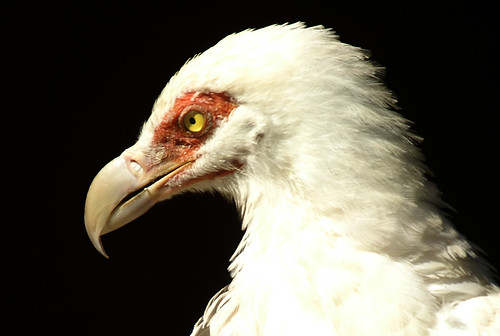Vulture Week: Palm-nut Vulture species profile
We're celebrating Vulture Week because this Saturday, September 6th, marked International Vulture Awareness Day (IVAD). This commemorative day has been celebrated since at least 2009 and aims to highlight the importance of vultures and vulture conservation through education.

Palm-nut Vultures are unusual among vultures and even among other birds of prey in that vegetable matter is a regular part of their diet. It is estimated that up to 65% of the diet of adult Palm-nut Vultures is made up of palm fruits, wild dates, and other plant material. In juvenile birds, this may be up to 90%! Their method of feeding on palm nut fruits is quite unusual. Palm-nut Vultures sometimes hang upside-down, holding the fruit in their talons, and using their beaks to pull off pieces to eat.
The remainder of the Palm-nut Vulture's diet consists of prey items like fish, crabs, small mammals, reptiles, and other birds. They are sometimes known by the name "Vulturine Fish Eagle." Palm-nut Vultures on feed on carrion occasionally. Palm-nut Vultures live in parts of Africa. Their range, which overlaps with the oil and raffia palm, is widespread; they can be found as far north as The Gambia and Kenya, and as far south as South Africa. Palm-nut Vultures are resident birds throughout their range; they may disperse seasonally but they are not migratory. During breeding season, they build (or reuse and improve) a large nest made of sticks in a tall tree. A single egg is laid per season and both parents incubate and care for the egg and for the growing chick.

Palm-nut Vulture by Ferran Pestaña (CC BY-SA 2.0)
Male and female Palm-nut Vultures look alike. Females average slightly larger than males, as is typical for most birds of prey. An adult's plumage is all white, with black feathers on the wings and an orange-red patch of bare skin on the face. Since they do not feed primarily on carrion, they have a more fully feathered head than other vultures. Palm-nut Vultures may live up to 27 years in captivity.







Comments
Leave a comment
Thank you!